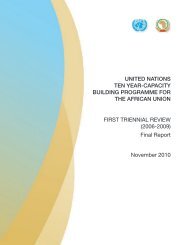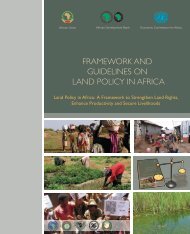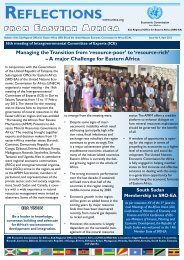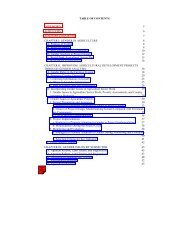A Decade of NEPAD - Economic Commission for Africa - uneca
A Decade of NEPAD - Economic Commission for Africa - uneca
A Decade of NEPAD - Economic Commission for Africa - uneca
Create successful ePaper yourself
Turn your PDF publications into a flip-book with our unique Google optimized e-Paper software.
96 A <strong>Decade</strong> <strong>of</strong> <strong>NEPAD</strong>: Deepening <strong>Africa</strong>n Private Sector and Civil Society Ownership and Partnership<br />
The AU/<strong>NEPAD</strong> <strong>Africa</strong>n Action Plan presents <strong>Africa</strong>’s<br />
development partners with a detailed plan <strong>of</strong> action with<br />
well analysed budgets, and <strong>Africa</strong>’s nations are steadfastly<br />
working to mobilize more domestic resources and improve<br />
their capacity to self-fund and implement the various<br />
components <strong>of</strong> <strong>NEPAD</strong>.<br />
Despite the lingering negative side effects <strong>of</strong> the global<br />
financial crisis that may impede the ability <strong>of</strong> the G8 and<br />
OECD countries to meet the commitments they made<br />
in 2005 to double their overseas development assistance<br />
contributions, there remains positive sentiment that an<br />
increase in assistance will yet be <strong>for</strong>thcoming over the<br />
next few years.<br />
It is also important <strong>for</strong> all to recognize that there are immediate<br />
opportunities <strong>for</strong> the <strong>Africa</strong>n private sector and<br />
civil society to engage with the <strong>NEPAD</strong> programme and<br />
to get involved in its implementation. There are also, more<br />
programmes and facilities than ever be<strong>for</strong>e to facilitate<br />
and support meaningful contributions to the <strong>NEPAD</strong><br />
process. Given the degree <strong>of</strong> support that has been mobilized<br />
around <strong>NEPAD</strong>, and the international networks<br />
that are being created and expanded daily, engagement in<br />
the “<strong>NEPAD</strong> process” <strong>for</strong> <strong>Africa</strong>n private sector and CSO<br />
constituents will foster technology transfer and pr<strong>of</strong>essional<br />
growth and development.<br />
With these various elements in rare alignment, 2010 – 2020<br />
is poised to be a decade <strong>of</strong> economic delivery in <strong>Africa</strong>.<br />
And <strong>NEPAD</strong> is well positioned to be the catalyst <strong>for</strong> growth<br />
that will be required to achieve the MDGs. Specifically, it<br />
is initiatives like the APRM process, CAADP, STAP and<br />
PIDA that are addressing a number <strong>of</strong> major governance,<br />
economic activity, and infrastructure development areas<br />
which are <strong>of</strong> significant <strong>of</strong> importance to all <strong>of</strong> the countries<br />
on the continent.<br />
Yet, it will be critically important that adequate ef<strong>for</strong>t is<br />
made by all parties to ensure that the <strong>NEPAD</strong> programme<br />
is publicised on the continent so that <strong>Africa</strong>ns begin to<br />
understand its goals and recognize the programmes benefits<br />
– as they begin to manifest themselves through increase<br />
peace, prosperity and growth across <strong>Africa</strong>. The<br />
brand “<strong>NEPAD</strong>” must be prominently associated with<br />
the many projects that have been launched toward its<br />
implementation.<br />
This publication has been developed to serve as a guide<br />
to past achievement and challenges <strong>of</strong> the <strong>NEPAD</strong> programme,<br />
as well as examine the issue <strong>of</strong> <strong>Africa</strong>n private<br />
sector and civil society ownership and partnership <strong>of</strong><br />
<strong>NEPAD</strong>. It is a roadmap and resource that can accelerate<br />
<strong>Africa</strong>n participation in <strong>NEPAD</strong> implementation. The<br />
tenets <strong>of</strong> Ghana’s “Sank<strong>of</strong>a”, looking backward to move<br />
<strong>for</strong>ward, are significant features <strong>of</strong> strategic thrust behind<br />
the development <strong>of</strong> this publication.<br />
“A <strong>Decade</strong> <strong>of</strong> Delivery” is also designed to encourage<br />
optimism in the <strong>NEPAD</strong> process and to stimulate increased<br />
engagement between supporters <strong>of</strong> <strong>NEPAD</strong> and<br />
key constituents <strong>of</strong> the programme. It is also hoped that<br />
all <strong>NEPAD</strong> stakeholders who read this document will be<br />
inspired by the analysis <strong>of</strong> the <strong>NEPAD</strong> process and commit<br />
themselves to working harder to overcome the challenges<br />
that have limited grassroots <strong>Africa</strong>n engagement in NE-<br />
PAD’s implementation in the past.<br />
Lastly, it is intended that through the dissemination <strong>of</strong> a<br />
holistic picture <strong>of</strong> the resources that are being mobilized<br />
to support <strong>NEPAD</strong> in <strong>Africa</strong>, and beyond, stakeholders<br />
in <strong>NEPAD</strong> will redouble their ef<strong>for</strong>ts to make <strong>NEPAD</strong> the<br />
<strong>Africa</strong>n-centred, people-powered, economic development<br />
programme that will drive <strong>Africa</strong>’s growth and development<br />
in the global society <strong>of</strong> the 21 st century.







